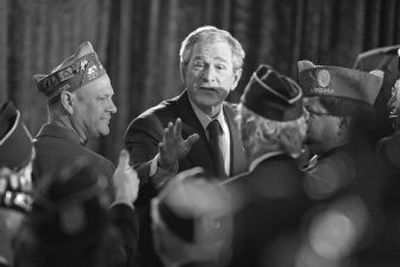Bush offers talks on war funds standoff

WASHINGTON – President Bush on Tuesday invited lawmakers to the White House next week to try to break the stalemate on Iraq war funding but made clear that he is not budging on his key demand – a “clean” bill with no “artificial deadlines” for withdrawal and that places no restrictions on his commanders on the ground.
At the same time, Bush used a morning visit to American Legion Post 177 in Fairfax, Va., to renew pressure on Congress to send him the spending bill, warning that the Pentagon will soon be forced to transfer another $1.6 billion in funds from other military accounts to make up for a looming shortfall in funding for the Iraq operations.
“Democratic leaders in Congress are bent on using a bill that funds our troops to make a political statement about the war,” Bush told the audience. “They need to do it quickly and get it to my desk so I can veto it, and then Congress can get down to the business of funding our troops without strings and without further delay.”
Democratic leaders reacted coolly to the latest mix of overture and threat from the president, with Senate Majority Leader Harry Reid, D-Nev., and House Speaker Nancy Pelosi, D-Calif., suggesting they would not attend the White House meeting unless Bush drops what they consider to be his preconditions.
“I’ve prided myself on being a pretty good trial lawyer,” Reid said. “I’ve settled lots and lots of cases. But you never settle a case going in saying, ‘You can come and meet with me, but here’s what the result’s going to be before we meet.’ That doesn’t work.”
The standoff between Bush and Congress involves about $100 billion in funding for the wars in Iraq and Afghanistan. Both chambers have approved separate bills providing the funding, but the two bills also call for effectively shutting down the war in Iraq through timetables for withdrawal. The House bill calls for all combat troops to be removed by August 31, 2008, while the Senate bill calls for withdrawals to begin 120 days after passage of the bill, with a goal of pulling all troops out by March 31, 2008.
Bush has said he would veto either bill – the two chambers must first reconcile their differences and send the legislation to his desk – and is calculating that he can keep enough Republicans in line to prevent the Democrats from assembling the two-thirds majority they need in both chambers to override a veto.
Toward that end, the White House has focused efforts in recent weeks on shoring up backing among conservatives, who remain strongly supportive of the war effort despite its unpopularity among the broader electorate.
With conservatives in mind, Bush is also complaining increasingly about spending provisions inserted by Democrats into the bills for non-war purposes. While Republicans did the same thing when they controlled the Congress, one senior administration official said the White House received a clear “lesson” from the midterm elections about how much conservatives dislike such “pork-barrel” spending. “This is right in our wheelhouse,” said this official, who discussed strategy only on condition of anonymity.
Veterans groups are another key White House constituency, and the Legionnaires gave Bush a standing ovation when he wrapped up his 37-minute speech in Fairfax. Several in the audience said they were particularly angry about the delays in war funding and extra projects added to Bush’s original budget request.